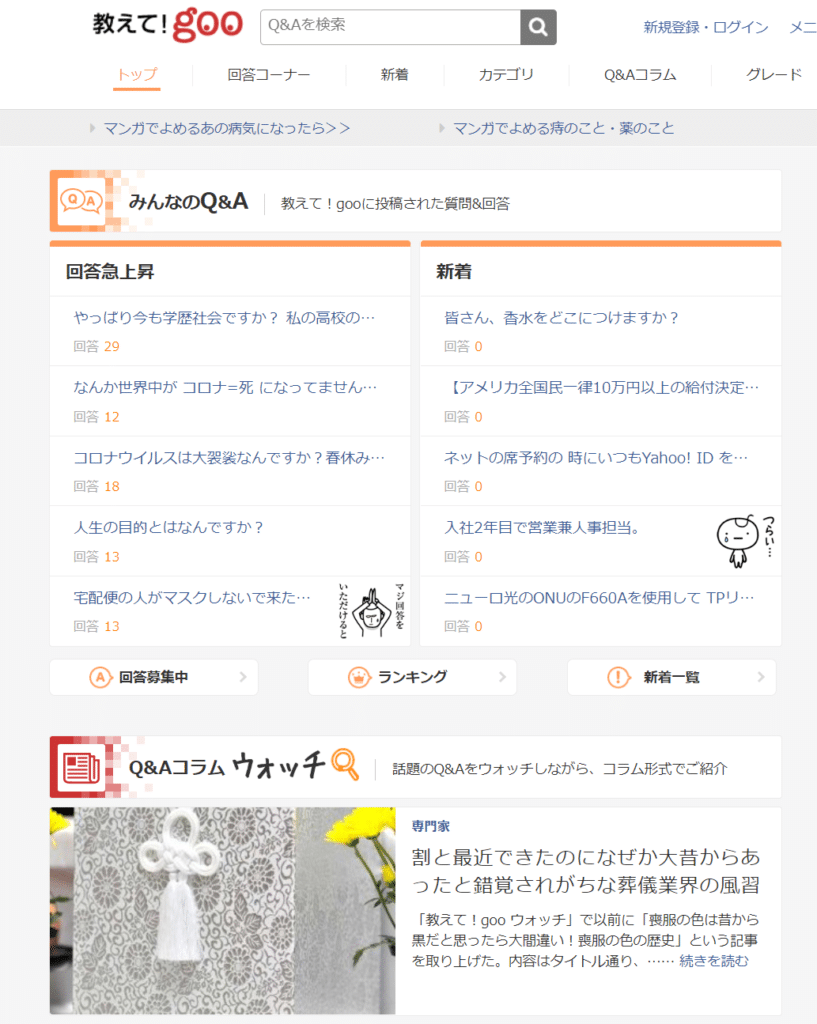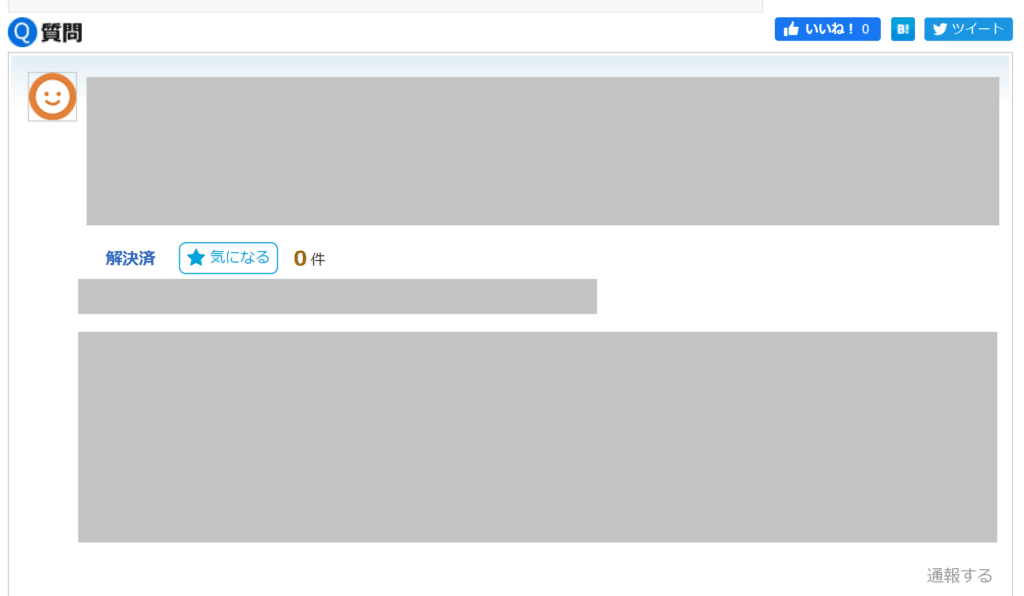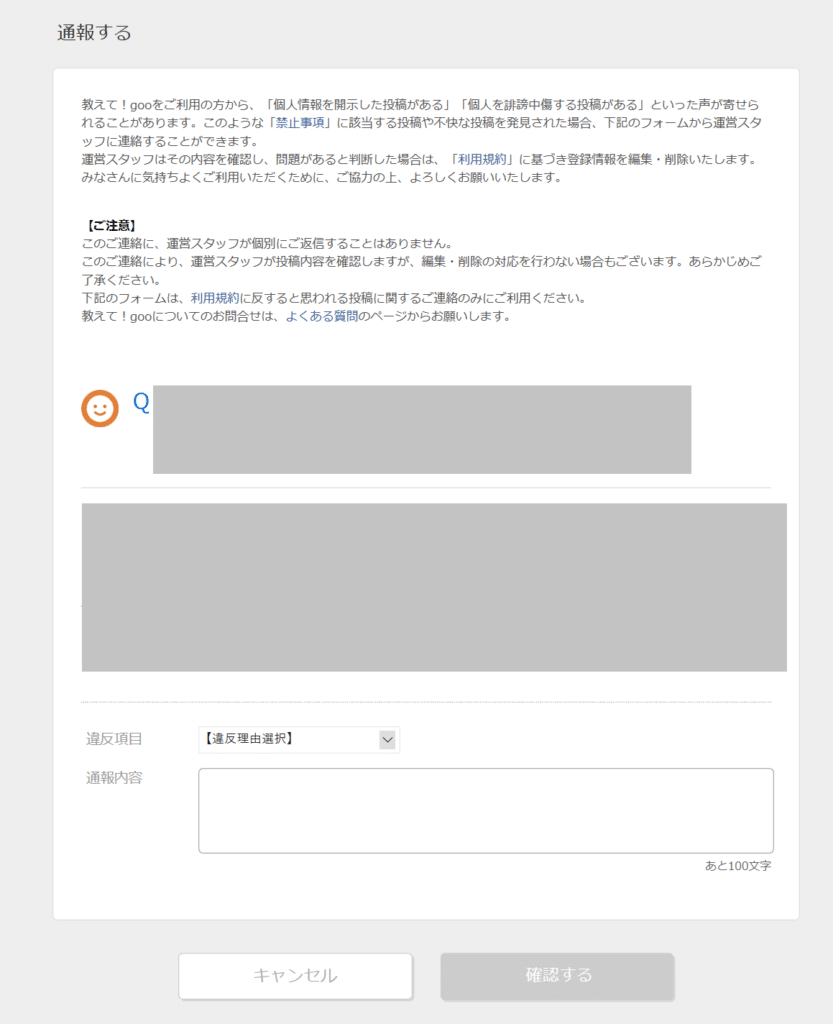What is the Method to Delete Negative Questions and Answers on 'Teach Me! goo'?

“Teach Me! Goo” is a Q&A community service where individuals respond to questions posted by others. The categories range widely, including “Advice & Life Consultation”, “Local Information, Travel & Outings”, and “Living, Lifestyle & Events”. Among the many questions and answers, there may be instances of negative posts such as a question like, “I was treated terribly by staff member A (real name) at XX, what do you think?” or a response to a question like, “I’m thinking of staying at the □□ Hotel, can anyone who has stayed there share their experience?” with a negative reply like, “The □□ Hotel doesn’t clean their rooms. It was so dirty, I would definitely advise against staying there.” In such cases, there is a risk that users who search for restaurant or hotel names on search engines like Google or within “Teach Me! Goo” may come across these negative posts.
If negative content is posted on “Teach Me! Goo”, is it possible to request the removal of such questions and answers? And under what circumstances should one consult a lawyer?
What is “Tell me! goo”?

“Tell me! goo” is a platform where users can post questions and receive answers. There is also a “Tell me! goo” app, so if you install the app, you can view questions and answers from the app as well. Therefore, there is a risk that if negative questions or answers about hotels or restaurants are posted, users who are searching for information on the “Tell me! goo” site or app may see these negative posts and avoid staying at the hotel or dining at the restaurant.
What are the Negative Questions and Answers Posted on Teach Me! goo?

On Teach Me! goo, you can post questions like “Which hotel would you recommend if you were to stay in this area?” and answers to them. There may be cases where negative questions and answers that could be considered defamatory are posted. What kind of negative questions and answers can be posted on Teach Me! goo? Examples of negative questions and answers are listed below.
Questions Criticizing a Specific Store’s Staff by Real Name
This is when a question like “I was treated terribly by staff A (real name) at ○○, what do you think?” is posted. There may be a communication gap between the staff and the poster, and such a question may be posted based on a misunderstanding. Nevertheless, information that the attitude of a specific store’s staff was bad could potentially have a negative impact on the management of the store.
Answers Stating that a Hotel Does Not Clean Its Rooms
This is when an answer like “□□ Hotel does not clean its rooms. It was too dirty, so you should definitely not stay there.” is posted in response to a question like “I’m thinking of staying at □□ Hotel, can anyone who has stayed there share their thoughts?”. Such an answer may be useful to users considering which hotel to stay at if the cleaning is indeed not done at all. However, there is a possibility that such an answer may be given based on the poster’s misunderstanding or malice. In such a case, if it is written that “□□ Hotel does not clean its rooms. It was too dirty, so you should definitely not stay there.”, the hotel may suffer damages such as a decrease in the number of guests due to that answer.
Other Groundless Defamatory Posts and Posts Causing Damage to Reputation
On Teach Me! goo, there may be posts that go beyond the scope of a problem-solving community site, such as defamatory posts against specific services, stores, their staff, etc., and posts that cause damage to reputation. It is thought that such posts should be deleted in the same way as defamatory posts and posts causing damage to reputation on anonymous bulletin boards like 5chan (formerly 2chan). The method for requesting deletion of posts on 5chan (formerly 2chan) is explained in detail in the article below.
https://monolith.law/reputation/deletionrequest-for-2chand5ch[ja]
How to Report Violations of the “Teach Me! Goo” Posting Guidelines
If you come across a post that you believe violates the “Teach Me! Goo” posting guidelines or terms of use, you can report it by clicking the “Report” button located at the bottom right of the question or answer.

Once you click the “Report” button and log in, the following screen will appear, where you can write and send the violation item and report content. According to the note at the top of the “Report” screen, the management staff will review the content and, if they determine there is an issue, they will edit or delete the registration information based on the “Terms of Use”.

According to the “Teach Me! Goo” posting guidelines, typical examples of prohibited actions are as follows. However, these are just examples, and prohibited actions are not limited to the content described in the posting guidelines. Also, if it is determined that the guidelines have been violated, or if some measures are necessary for the provision of comfortable services, actions such as deletion of posts may be taken based on the “Terms of Use”.
“Teach Me! Goo” Posting Guidelines (Excerpt)
https://blog.goo.ne.jp/oshietegoo/e/8b3c38e5134b86b934b07ef536caa746[ja]
・Defamation, actions that hurt others
・Actions related to illegal activities
・Actions against public order and morals
・Disclosure of personal information
・Infringement of others’ privacy (etc.)
According to these posting guidelines, questions like “What do you think about the terrible attitude of staff A (real name) at ○○?” can be reported as “Infringement of others’ privacy”. In this case, the “Violation Item” to select on the report screen would be “Disclosure of Personal Information”.
Examples of Removal Requests Based on Illegality

When considering the “Slander, Acts that Hurt Others” section of the Teach Me! Goo Posting Guidelines, it may be necessary to consider defamation (infringement of the right to honor). The requirements for defamation are as follows:
- Publicly
- Pointing out facts
- Defaming someone’s honor
If, as in the example above, someone has written, “The □□ Hotel does not clean its rooms. It was so dirty that you should definitely not stay there,”
The statement, “The □□ Hotel does not clean its rooms. It was so dirty that you should definitely not stay there,” has a specific meaning, and the hotel’s hygiene management is subject to certain legal regulations. Being perceived as a hotel that does not clean its rooms is disadvantageous for the hotel in question, so the hotel would argue that it is properly cleaning its rooms. However, even if the requirements for defamation are met, defamation does not occur if the following conditions are met, so please be careful.
- There is public interest
- There is public benefit
- It is true or truthfulness is recognized
Not only the above example, but also other posts that seem to be slanderous or damaging to reputation, it may be necessary to consider whether they constitute defamation. However, deletion negotiations based on such claims and legal arguments may be difficult if you are not familiar with the law. There are many cases where you can smoothly delete by consulting with a lawyer who has a wealth of knowledge about defamation. For more details on the requirements for defamation, please see the article below.
https://monolith.law/reputation/defamation[ja]
Removal by Provisional Disposition
If your report through the “Report” button does not result in the removal of a question or answer, you can request removal through the courts. Questions and answers on “Teach me! goo” can be removed not only through litigation but also through a procedure called provisional disposition. Litigation can take at least 3-12 months, and in some cases, it may take more than a year. On the other hand, with provisional disposition, if you consult with a lawyer who is knowledgeable about reputational damage, there are many cases where removal can be achieved in about 2-3 months from the time of request.
The flow of provisional disposition is as follows:
- Filing for provisional disposition
- Examination (a procedure similar to oral argument)
- Payment of security deposit
- Issuance of provisional disposition order
- Execution
In the case of provisional disposition, not only legal claims but also evidence to substantiate those claims is required. For example, if a post is made as follows: “The □□ Hotel does not clean its rooms. It was too dirty, so it’s definitely better not to stay there,” you would:
- Submit the cleaning manual of the hotel in question
- Submit a document signed by the person in charge stating that the room has been cleaned
as evidence and argue that “The hotel in question is properly cleaned.” However, proving such claims may be difficult to do on your own without the help of a lawyer. For more details on provisional disposition for removal, please refer to the article below.
https://monolith.law/reputation/provisional-disposition[ja]
Identifying the Poster through Provisional Disposition
If there are a large number of baseless defamatory or damaging rumors in the form of questions and answers posted over a long period of time, you can request a lawyer to make a request for disclosure of sender information. The request for disclosure of sender information is a procedure based on Article 4, Paragraph 1 of the Japanese Provider Liability Limitation Act. Through this procedure, you can request the disclosure of information such as the IP address, name, and address of the poster of defamatory or damaging rumors.
While “Teach Me! Goo” has guidelines and terms of use to prevent defamatory posts, there may be cases where individuals with grudges against specific services or companies post baseless rumors or defamation. In such cases, if the poster’s IP address is known, it may be possible to identify the poster. The procedure for identifying the sender is as follows:
Request for Information Disclosure to Content Service Provider
- Application for provisional disposition for disclosure of sender information
- Identify the transit provider
- Application for provisional disposition to prevent deletion of sender information to the transit provider
- Lawsuit for request for disclosure of sender information
- Identify the sender based on the court’s judgment
After going through the above procedures and identifying the poster, you can claim damages from the poster for the attorney’s fees and consolation money required to identify the poster. For more details on the request for disclosure of sender information, please refer to the following article.
https://monolith.law/reputation/disclosure-of-the-senders-information[ja]
Summary
“Teach Me! Goo” is a convenient website and app where you can post various questions and answer them. However, it cannot be denied that there are posts that defame or cause reputational damage based on misunderstandings or malice. In such cases, it may be better to request deletion through the “Report” button, request deletion through the court, or proceed with identifying the poster. It is often difficult to make legal claims such as defamation without the help of a lawyer. If you are troubled by defamatory or reputation-damaging posts, it is important to consult with a lawyer who is familiar with these issues.
Category: Internet





















